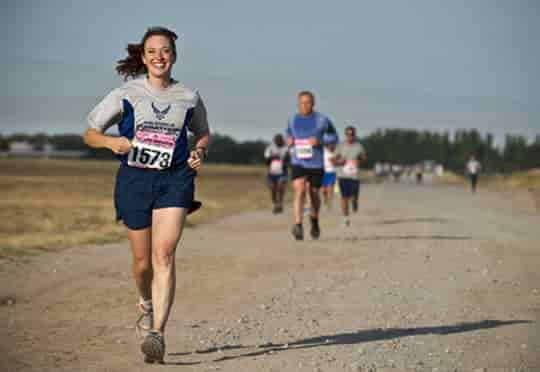How to reduce the risk of lung problems that are a leading cause of death in COVID-19 patients.
Acute respiratory distress syndrome (ARDS) is a serious lung condition that occurs in COVID-19 patients.
However, daily exercise training could reduce the likelihood of developing ARDS.
A review of medical studies suggests that exercise promotes the production of an antioxidant enzyme called extracellular superoxide dismutase (EcSOD) that can block or decrease ARDS severity.
According to The Centers for Disease Control and Prevention, about 20 to 42 percent of COVID-19 patients who are hospitalised will have ARDS and about 45 percent of patients with severe ARDS won’t survive.
Professor Zhen Yan, the study’s first author, said:
“All you hear now is either social distancing or ventilator, as if all we can do is either avoiding exposure or relying on a ventilator to survive if we get infected.
The flip side of the story is that approximately 80% of confirmed COVID-19 patients have mild symptoms with no need of respiratory support.
The question is why.
Our findings about an endogenous antioxidant enzyme provide important clues and have intrigued us to develop a novel therapeutic for ARDS caused by COVID-19.”
The potent antioxidant EcSOD captures free radicals and so protects the cells from damage and illness.
People with coronary heart disease, acute lung disease, osteoarthritis, and kidney failure have low levels of the antioxidant.
A study in mice has shown that by blocking the production of EcSOD, heart conditions will get worse and by increasing its production, health problems will reduce.
Each session of cardio exercise boosts the amount of EcSOD naturally made by the muscles, which are then circulated around the body.
Professor Yan said:
“We cannot live in isolation forever.
Regular exercise has far more health benefits than we know.
The protection against this severe respiratory disease condition is just one of the many examples.”
The review suggests that EcSOD is not only a potential treatment for ARDS but can also work for other illnesses.
For instance, gene therapy can boost antioxidant production and protect the lungs from COVID-19.
EcSOD has already been suggested for treatment of diabetic retinopathy, a condition which can cause blindness.
The antioxidant might also benefit patients with multi-organ dysfunction syndrome, a progressive disorder which leads to multiple organ failure.
Professor Yan concluded:
“We often say that exercise is medicine.
EcSOD set a perfect example that we can learn from the biological process of exercise to advance medicine.
While we strive to learn more about the mysteries about the superb benefits of regular exercise, we do not have to wait until we know everything.”
The study was published in Redox Biology (Yan & Spaulding, 2020).

